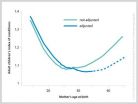(Press-News.org) Pollinating insects contribute to agricultural production in 150 (84%) European crops. These crops depend partly or entirely upon insects for their pollination and yield. The value of insect pollinators is estimated to be €22 billion a year in Europe. Declines in managed pollinators, such as honeybees, and wild pollinator such bumblebees, solitary bees and hoverflies, are therefore of growing concern as we need to protect food production and the maintain wildflower diversity.
Scientists involved in STEP, a large-scale project funded by the 7th Framework Program (FP7) of the European Union, have therefore taken an inclusive approach looking at the status and trends of all Europe's pollinators.
New findings have been presented at a dedicated STEP symposium at the 5th EurBee meeting held in Halle, Germany on 3-6 September 2012. Prof Simon Potts from the University of Reading, UK and coordinator of STEP opened the discussion: "To help Europe secure sustainable food production and conserve its biodiversity we need to provide policy makers with clear evidence of who pollinates our crops and flowers and what are the best options to safeguard pollination services in a changing world"
More than 32 million European records of pollinators and plants have been analysed. "We have shown that not only has bee diversity been declining but communities are becoming more uniform in their composition", commented the lead scientist Dr Koos Beismeijer from Netherlands Centre for Biodiversity Naturalis, The Netherlands
One key threat to bees is agrochemicals; "we are now finding strong negative effects of pesticides, not only in honeybees and bumblebees, but also solitary bees– as Europe has more than 2,500 solitary bee species we expect the implications of our research to be very wide ranging" said Dr Christoph Sandrock of Swiss Bee Research Centre.
Many European countries have an array of agri-environment options aiming to support biodiversity, including bees, but it is unclear how effective these really are. "Our analysis is the first to systematically test whether agri-environment options are actually benefiting bees" said Dr David Kleijn from Alterra, Netherlands.
Several European countries have programmes aiming to improve honeybee health, but there is very little support for wild pollinators despite their critical roles in ecosystems. "One of the big achievements of the STEP project will be the first ever European Red List for bees which will provide an essential tool for politicians and land managers to direct conservation efforts targeted at wild bees" said Mr Stuart Roberts from University of Reading, UK.
"There is increasing evidence that honeybee numbers are insufficient in many parts of Europe to provide adequate pollination services, and so wild pollinators are needed to cover the shortfall" stated Dr Tom Breeze from University of Reading, UK.
The STEP project will continue to use high quality research to deliver the evidence politicians need to develop better policies to protect all of Europe's pollinators. The project also uses its findings to develop specialist factsheets targeted at groups such as farmers and translated in 15 languages: see http://step-project.net/page.php?P=4&SP=14
Simultaneously, STEP is undertaking a broad-scale survey of the public opinion through online questionnaires available in seven European languages. The survey aims to reveal if, and to what extent, people are aware of the role of pollinators in agricultural ecosystems and the consequences for the environment from the decline of bees and other insect pollinators. Please spend 5 minutes of your time and fill it in at: http://www.step-project.net/page.php?P=26
INFORMATION:
Original source:
1. Pollinators Support Farm Productivity. STEP best practices recommendations for farmers to maintain the diversity of pollinators in 15 languages: http://step-project.net/page.php?P=4&SP=14.
2. Online questionnaire to survey the public opinion on the role of pollinators: http://www.step-project.net/page.php?P=26.
Additional information:
STEP (2010) stands for "Status and Trends of European Pollinators" and is a European research project. Financed by the 7th EU framework programme for research and development (FP7), STEP aims xxx. For more information please see: www.STEP-project.net
Posted by Pensoft Publishers.
Wild bees: Champions for food security and protecting our biodiversity
2012-09-06
ELSE PRESS RELEASES FROM THIS DATE:
Study: Married lung cancer patients survive longer than single patients after treatment
2012-09-06
CHICAGO – Sept. 6, 2012. Married patients with locally advanced lung cancer are likely to survive longer after treatment than patients who are single, according to a study by researchers at the University of Maryland Marlene and Stewart Greenebaum Cancer Center in Baltimore. The results of the retrospective study are being presented at the 2012 Chicago Multidisciplinary Symposium in Thoracic Oncology.
The University of Maryland researchers studied 168 patients with Stage III non-small cell lung cancer, the most common type of lung cancer, who were treated with chemotherapy ...
New research: Soluble corn fiber plays important role in gut health and calcium absorption
2012-09-06
Chicago – (Sept. 6, 2012) – Savvy consumers and health professionals know that fibre is an essential nutrient associated with important health benefits, yet barriers such as overall poor tolerance to higher-fibre diets may be why average intake is far less than experts recommend (1). Two new research studies supported by Tate & Lyle, the global provider of specialty food ingredients and solutions, provide further evidence that certain higher-fibre diets can in fact be well-tolerated, and that fibre may play an important role in supporting a healthy gut as well as promoting ...
Breast cancer screening saves lives, new study shows
2012-09-06
The study, published today in Cancer Epidemiology, Biomarkers and Prevention is the largest of its kind in Australia and one of the largest in the world. It followed about 4,000 women in a study of the BreastScreen program in Western Australia.
University of Melbourne Research Fellow Dr Carolyn Nickson and colleagues from the Melbourne School of Population Health said the findings reaffirmed the importance and efficacy of mammography.
The study focused on women aged 50-69 years, who are in the target age range for screening. It included 427 cases where women had died ...
Chikyu sets a new world drilling-depth record of scientific ocean drilling
2012-09-06
Off Hachinohe, Japan—Scientific deep sea drilling vessel Chikyu sets a world new record by drilling down and obtains rock samples from deeper than 2,111 meters below the seafloor off Shimokita Peninsula of Japan in the northwest Pacific Ocean. The Japan Agency for Marine-Earth Science and Technology (JAMSTEC), the implementing organization for scientific expedition aboard the Chikyu, announced this achievement on 6th September, 2012.
Chikyu made this achievement during the Deep Coalbed Biosphere expedition, Expedition 337, conducted within the framework of an international ...
Almost 1 in 5 young children with cancer suffers from a trauma disorder
2012-09-06
People who suffer from posttraumatic stress disorder relive their traumatic experiences in the form of flashbacks and nightmares – and in childhood, also in traumatic plays during which they re-enact the experience over and over again. They avoid stimuli that remind them of the trauma or suffer from vegetative hyperarousal such as insomnia, hypervigilance or concentration problems. For the first time, researchers from the University of Zurich and the University Children's Hospital Zurich now show that infants and toddlers can also develop posttraumatic stress disorder in ...
Joint EACPR and AHA statement empowers health care professional to use Clinical Cardiopulmonary Exercise Testing
2012-09-06
Sophia Antipolis, 6 September 2012: The European Association for Cardiovascular Prevention and Rehabilitation (EACPR), a registered branch of the European Society of Cardiology (ESC), and the American Heart Association (AHA) have today issued a joint scientific statement http://eurheartj.oxfordjournals.org/content/early/2012/08/24/eurheartj.ehs221.short?rss=1 that sets out to produce easy-to-follow guidance on Clinical Cardiopulmonary Exercise (CPX) testing based on current scientific evidence. The document, which has been published simultaneously online in the European ...
Family literacy project exceeds expectations
2012-09-06
A unique approach to early literacy work with families where children develop their language skills and their ability to read and write from an early age has had a huge success.
Researchers from the University of Sheffield funded by the Economic and Social Research Council (ESRC) initially planned to use the approach with around 60 families, but discovered that around 6,000 had actually benefited from their work.
Professor Cathy Nutbrown of the University of Sheffield, who led the project, shared her approach to family literacy with Early Years practitioners including ...
Advanced maternal age not harmful for adult children
2012-09-06
This press release is available in German.
It had been thought that mothers delivering later in life have children that are less healthy as adults, because the body of the mother had already degenerated due to physiological effects like decreasing oocyte quality or a weakened placenta. In fact, what affects the health of the grown-up children is not the age of their mother but her education and the number of years she survives after giving birth and thus spends with her offspring. This is the conclusion of a new study by Mikko Myrskylä from the Max Planck Institute for ...
Multi-functional anti-inflammatory/anti-allergic developed by Hebrew University researcher
2012-09-06
Jerusalem, Sept. 6, 2012 – A synthetic, anti-inflammatory and anti-allergic family of drugs to combat a variety of illnesses while avoiding detrimental side effects has been developed by a Hebrew University of Jerusalem researcher.
The researcher is Saul Yedgar, who is the Walter and Greta Stiel Professor of Heart Studies at the Institute for Medical Research Israel-Canada at the Hebrew University Faculty of Medicine.
Inflammatory/allergic diseases affect billions of people worldwide, and treatments for these conditions are a major focus of the pharmaceutical industry. ...
Earlier treatment for young patients with chronic hepatitis B more effective in clearing virus
2012-09-06
Scientists from A*STAR's Singapore Institute for Clinical Sciences (SICS), together with clinical collaborators from London , discovered for the first time that children and young patients with chronic Hepatitis B Virus infection (HBV carriers) do have a protective immune response, contrary to current belief, and hence can be more suitable treatment candidates than previously considered.
This discovery by the team of scientists led by Professor Antonio Bertoletti, programme director and research director of the infection and immunity programme at SICS, could lead to ...



